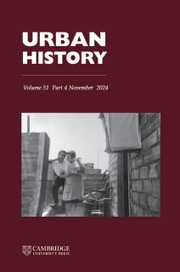Following on from his Globalists: The End of Empire and the Birth of Neoliberalism, Quinn Slobodian continues his exploration of how neoliberal individuals and organizations have shaped the world today. Whilst Globalists focused on the ‘Geneva School’ of neoliberal thinkers, Crack-Up Capitalism features wide-ranging case-studies and a cast of eclectic characters, from three generations of Friedmans (Milton, David, Patri) to Silicon Valley anarcho-capitalists. Per Slobodian, the Geneva School saw democracy as both a ‘potential threat to the functioning of the market order’ and dangerous in ‘its legitimation of demands for redistribution’ (Globalists, p. 272). Crack-up capitalists see political freedoms as preventing the proliferation of true freedom, which in their conception means economic freedom, for example through the unfettered mobility of capital.
Very recently, Urban History has seen an uptick in case-studies of a British crown colony on China’s doorstep, Hong Kong. Crack-Up Capitalism echoes this interest. Hong Kong is frequently cited by Slobodian’s market radicals; he ended Globalists in Hong Kong with a 1978 meeting of the Mont Pelerin Society, and he begins Crack-Up Capitalism with a chapter on ‘Two, three, many Hong Kongs’.
At the heart of the book is the concept of ‘zones’, for which Hong Kong was the model. ‘At its most basic’, Slobodian explains, a zone ‘is an enclave carved out of a nation and freed from ordinary forms of regulation’, which could range from simple tax-free zones to full abdication of national sovereignty over a portion of land (pp. 2–3). Zones are islands (physically or metaphorically) shielded from the controls of national or international governments. Crack-up capitalists ‘created a Portable Hong Kong’ based on their particular understanding and reading of the reasons behind the colony’s success (p. 23). Throughout the book, we see various claims or suggestions of using Hong Kong as a model: London’s Canary Wharf (or ‘Hong Kong-on-Thames’); the ‘pseudo-nation’ of Ciskei in apartheid South Africa; ‘a handful of Eastern European “Hong Kongs”’; charter cities in Honduras. As Slobodian succinctly puts it, for developing countries pondering zones, ‘You had nothing to lose and Hong Kong to gain’ (p. 188).
The concept of zones should naturally be of interest to urban historians, but there are further gleanings and points of interest for the field. Crack-Up Capitalism follows Globalists in exploring the tension between national sovereignty and the freedom to move capital. Throughout Crack-Up Capitalism, we see the conflict and co-operation between zones and the polities around them, suggesting that these relationships are much more complex than simple scalar differences. Analysis of urban built environments and verticality are interspersed throughout the book, through case-studies like London, Hong Kong and Dubai. Forms of urban governance are discussed, from Margaret Thatcher’s dismantling of the Greater London Council, to China learning from Hong Kong how to segment space and from Singapore how to govern zones. The concept of ‘secession’ is interesting both when applied to the physical (racialized gated communities) and the virtual (the ‘metaverse’). At the end of each chapter, Slobodian shows us that the claims made by crack-up capitalists do not show the full picture. To illustrate this, near the end of chapter 10 he reminds us that ‘the charter city dream in Honduras was made possible only by a violently repressive government’ (p. 198).
Slobodian brings us back to the ‘ur-zone’ of Hong Kong in the conclusion, ‘Be water’. This was martial artist Bruce Lee’s mantra, but also the guiding philosophy behind the protesters in the anti-extradition bill protests of 2019, which spiralled into mass dissent and an increasingly hardline government crackdown. On China’s ‘Belt and road initiative’ and more generally, Slobodian concludes that whilst the public relations machinery behind zones wax lyrical over seceding from states, not only is it state governments who build the infrastructure and conditions necessary for zones to exist, but states ‘are using them as tools to advance their own purposes’.
To offer some critique, certain chapters in the book would benefit from a more sustained focus: chapter 2, ‘City in shards’, jumps at times haphazardly between London, Hong Kong and the US. Chapter 9 on Dubai reads increasingly like a potted history of Dubai’s investments outside of its borders. The jump from gated communities in chapter 6 to the principality of Liechtenstein in the next chapter is somewhat jarring scalarly; the findings from focusing on Milton Friedman’s son David and his LARPing (Live Action Role-Playing) tendencies are interesting if not slightly conjectural.
Finally, to return to Hong Kong, Crack-Up Capitalism recalls libertarian Michael van Notten’s unfulfilled idea of populating tax-free zones in Europe with Hongkongers, as ‘agents of capitalist spread’ (p. 154). Recently, these ur-zoners have been pulled away by new immigration policies, namely through the various ‘lifeboat’ schemes offered to Hongkongers since the promulgation of the National Security Law there. Though not delineated as ‘zones’, here we can arguably see governments as corporations offering subscription models to potential customers: study at a Canadian university and you could become a citizen; come to Australia under slightly more lenient conditions for a few years and you could become a citizen; pay a British National Health Service surcharge for a few years and you could become a citizen. Crack-Up Capitalism’s final chapters explore Silicon Valley libertarians and their visions of exiting to ‘sovereign corporations’. Here, we see the old imperial core and its closest descendants getting in on the act.



